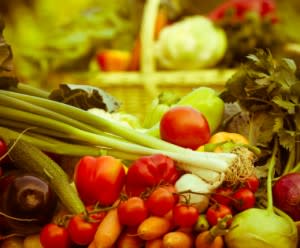MyPlate Mondays: Vegetables
What is a vegetable?
Vegetables include storage parts, leaves, and stems of plants (everything except seeds and sweet fruits)
How much do I need?
Adults need 2-3 cups daily.
Remember:
Make half your plate fruits and vegetables
(Find out how many servings of vegetables you need. Use this chart to determine what a cup is.)
Vegetables provide numerous vitamins and nutrients and should make up around 30% of your plate. Vegetables include the roots (carrots, beets, turnips), tubers (potatoes, yams), leaves (spinach, chard, lettuce), flower buds (broccoli, cauliflower), and stems (celery, asparagus, bamboo). Some vegetables are biologically fruits, because they contain seeds (tomatoes, cucumbers, zucchinis). But the debate over whether a tomato is a fruit or a vegetable has little bearing on how nutritious it is.
Vegetables can be split into four groups (full list here) based on what nutrients and vitamins they provide most:
| Dark green | Vitamins A, C, and K, iron, calcium | broccoli, collard greens, kale, spinach, romaine lettuce |
| Starchy | fiber, B vitamins | corn, green peas, lima beans, plantains, potatoes |
| Red and orange | fiber, vitamins A, C, E, K, folate | carrots, squashes, pumpkin, red peppers, tomatoes, sweet potatoes |
| Other | artichokes, asparagus, avocado, beets, cabbage, cauliflower, cucumbers, green beans, mushrooms, iceberg lettuce, onions, zucchini | |

The above list is by no means comprehensive. Each vegetable provide several important nutrients, so eating a large variety in each meal will give your body the healthy boost it needs. One easy way: make your meals colorful! All the different vitamins help your body in different ways: Vitamin A for eyes and skin, Vitamin C for the immune system, and folate for forming red blood cells. A 2003 study suggests that just eating the vitamin is not enough, but that the vitamins in fruits and vegetables can act more efficiently when consumed as part of the food.
Vegetables are naturally low-fat, low-calorie, and cholesterol-free. Certain nutrients gained from vegetables can help maintain good health. For example, potassium (found in potatoes, sweet potatoes, tomatoes, spinach, and soybeans) can help you manage your blood pressure. Fiber (found in starchy vegetables), helps with bowel function, can reduce blood cholesterol, and lower the risk of heart disease. And as this blog post explains, vegetarians may gain up to a decade of extra life!
Tips on adding veggies into your diet:
- buy frozen pre-cut veggies to save time
- plan meals around a vegetable main course
- don’t just waste time steaming veggies but experiment with quick stir-fries and microwaving
- add healthy spices (oregano, rosemary, turmeric, ginger, garlic, red peppers) to make vegetables appealing to the pickiest eaters
- sneak mild veggies like spinach and cabbage into fruit smoothies, blend them into sauces, and grate carrots and zucchinis into baked goods
